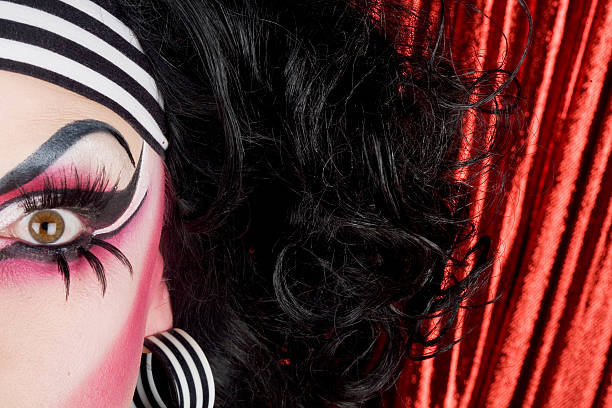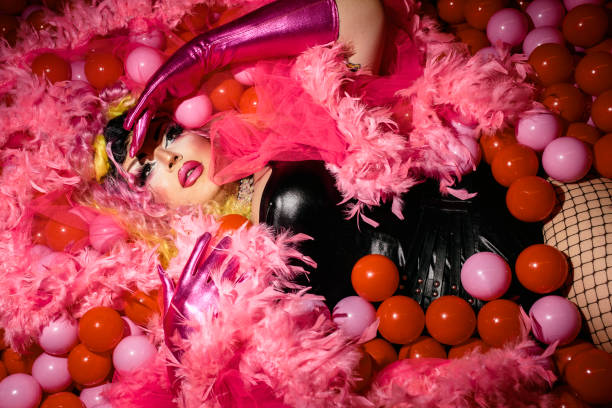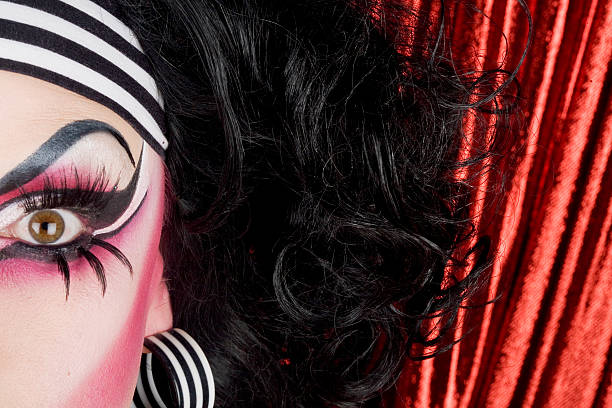- Enoch Oyedibu
- Cross-dressing, Entertainment, Lifestyle, Transsexual
- 0 Comments
- 20460 Views
The grit for fame drives many people to drink from the devil’s cup. Many times, this makes teething fame-mongers to dive dangerously into controversial activities that can either endanger their lives or their career.

In 2022, this plays out with Abdullahi Adisa, popularly known as Trinity Guy. He bagged a jail term over an extreme skit. He is famous for extremely diving his victims consciously and unconsciously into purely abnormal acting. But he is not alone. There have been many other skit makers who, for the sake of fame, lured unsuspecting victims to uncompleted buildings to attempt rape. After nearly doing the deed, then, they would call it a ‘prank’. As expected, few people do questions this novel narrative, while many others decorate it as “creativity.”
The same grit, however, births crossdressing. Many years back, crossdressing is used as a tool of disguise and humour. It involves using what is logically and socially associated with the opposite sex vice versa. When women crossdress, it is not usually a social sin but when men crossdress it is seen as derogatory, sinful, and illegal in some countries with such laws bounding the act. Both females and males usually crossdress, under either guise of pretence to escape quizzing of a crime or to invoke humour, causing controversy and then, be famous. This—fame—especially, is always intended be it for negativity or positivity since people, nowadays, have redefined the nature of obscene and immoral things as “creativity and cultural advancement.”
Cross-dressing has been practised throughout much of recorded history, in many societies, and for many reasons. Examples exist in Greek, Norse, and Hindu mythology. Cross-dressing can be found in theater and religion, such as kabuki, Noh, and Korean shamanism, as well as in folklore, literature, and music. For instance, in examining kabuki culture during Japan’s edo period, cross-dressing was not only used for theater purposes but also because of current societal trends: cross-dressing and the switching of genders was a familiar concept to the Japanese at the time which allowed them to interchange characters’ genders easily and incorporate geisha fashion into men’s wear. This was especially common in the story-telling of ancient stories such as the character Benten from Benten Kozō. He was a thief in the play cross-dressing as a woman.

Maybe, it is still a joke, but recognizing a man for an award meant for a woman is overly humourous—maybe a delusion of grandeur.
In Nigeria, different great men have their histories as crossdressers, once or twice, to escape arrest. While Nigeria also has Crossdressers like James Obialor (James Brown), Denrele Ebun, etc; both Brown and Ebun have come out publicly to say they’re men, making themselves fall short of being called a trans person but just a crossdresser.
Moreover, both transsexual and crossdressing onuses are normal in societies that accept them. Unlike Nigeria, where they’re not. Though, it booms like an inferno. But what is quite very sacrosanct to address is a man who prefers to be called a woman and dress like such, does not change his gender. He only does it for fame—what every other die-hard fanatic of fame, would do—to get known—threading on controversy. Nigeria does not gives room for cross-dressing or any LGBT+ persons and neither does it logically , to indulge in acts criminalized by more than 145 countries of the United Nations. Maybe, it is still a joke, but recognizing a man for an award meant for a woman is overly humourous—maybe a delusion of grandeur.
…to address is a man who prefers to be called a woman and dress like such, does not change his gender.
Interestingly, whether employing crossdressing concept to signal humour, wish for fame, or pool controversy, it has always been a wrong narrative in Nigeria. Same-sex sexual activity is prohibited under the Criminal Code Act and the Same-Sex Marriage (Prohibition) Act 2013 (SSMPA), which between them criminalize acts of ‘carnal knowledge against the order of nature’, ‘gross indecency’, same-sex unions, and LGBT advocacy. Crossdressing falls along the clause for ‘gross indecency.’ These provisions, according to Human Dignity Trust, carry a maximum penalty of fourteen years imprisonment. Both men and women are criminalised under the law. Same-sex sexual activity is also criminalised at the state level through Sharia law, under which the maximum sentence is death by stoning. In addition to potentially being captured by laws that criminalise same-sex activity, trans people may also face prosecution under state-level Sharia laws. These laws were inherited from the British during the colonial period, in which English criminal law was imposed upon Nigeria. Nigeria retained these provisions upon independence and further criminalised LGBT people through the adoption of the SSMPA in 2013. At the state level, the northern states criminalise same-sex sexual activity through an interpretation of Sharia law. There is substantial evidence of the law being enforced in recent years, with LGBT people being frequently subject to arrest, individually or en masse, often accompanied by police violence and brutality. A high-profile case saw 57 people arrested at a party in August 2018, with 47 of them subsequently being charged and tried under the SSMPA, before the case was thrown out in 2020. There have been consistent reports of discrimination and violence being committed against LGBT people in recent years, including assault, mob attacks, harassment, extortion, and the denial of basic rights and services.

Beyond all these laws, a case against James Brown was dropped and many likes of him have reigned supreme in Nigeria silently. One of them is Okuneye Idris Olanrewaju, popularly known as Bobrisky who, despite being a man dressing like a woman, received the award of Best Dressed Female in Eniola Ajao’s newest movie premiere. With this, it logical to say that maybe Nigeria is already planning to turn its back on all its SSMPA provisions and give all genders their rights to exist, including trans people. But whether for fame, for humour, for fun, or rights’ sake, if Eniola Ajao’s “Ajanaku: Beast of Two Worlds,” gave Bobrisky the gift of garland on the title of Best Dressed Female of the Night, along with a prize of one million nairas, does it really worth it over controversies?










